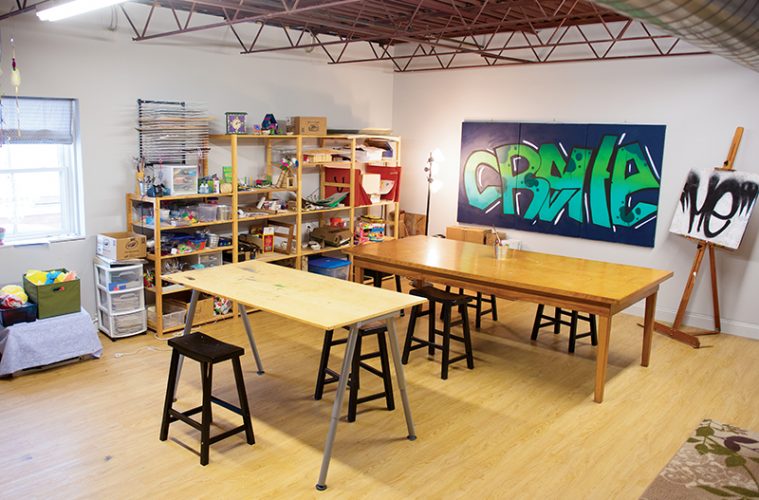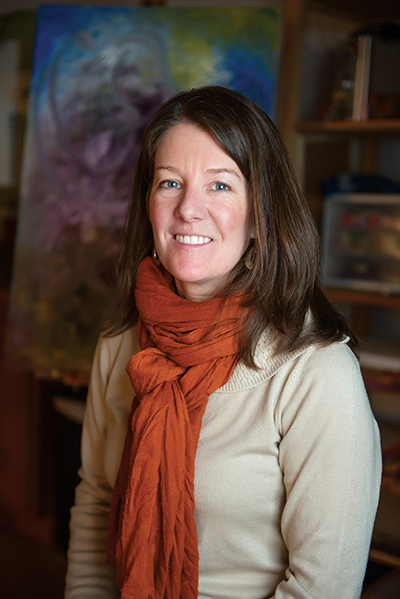It might be a middle-aged man who’s enduring the heartache of divorce, or a little girl whose mother recently passed away. It might be a family who’s going through tough times and needs to work together to make things better. Whatever the situation, whomever the person, art therapy can help.
“It’s a way that somebody can express themselves in a different way rather than just sitting and talking,” says Stephanie Musial, ATR-BC, LMHC, owner of Creative Bridges, an art therapy and mental health counseling practice in Amesbury. Located in a sunny studio at 14 Cedar Street in a renovated mill building, Creative Bridges is a safe, open place where people can use art—including visual art, music, and movement—to express themselves, relax, and receive a different kind of counseling from traditional talk therapy.
Musial, who has a bachelor’s degree in art therapy from Emmanuel College in Boston and a master’s degree in expressive therapy with a specialization in art therapy from Lesley University in Cambridge, opened her practice in 2008. In addition to her private practice, Musial is a go-to expert for art therapy on the North Shore, with work as a consulting art therapist for Northshore Education Consortium, adjunct professor at Endicott College, and supervisor for Lesley College graduate interns.
Creative Bridges is set up like an art studio, with paints, brushes, paper, and other art supplies. The 45-to 50-minute sessions begin with Musial and the patient talking and deciding together what kind of project they’d like to work on that day, or what kind of art supplies they’d like to explore.
“I’m meeting them where they’re at for the day,” she says.
|
For adults and children, simply engaging in the act of being creative and making art can be a positive experience. People not only let their guard down and relax through art but are also able to find success and pride—feelings that might be in short supply during tough times—when they’ve finished a project and created something beautiful.
“When art is being used, anxiety decreases, and it increases someone’s self esteem,” Musial says. Plus, once anxiety is down and self-esteem is up, clients find it easier to open up and talk.
Although a variety of patients are referred to Creative Bridges through physicians, schools, and other resources, Musial most often works with elementary-, middle-, and high school-aged children. She says kids tend to use pictures and play to express themselves rather than talking. That’s why art therapy is a good alternative to traditional talk therapy for children.
“It’s not as intimidating for kids; they’re not having to sit there with an adult in a chair,” Musial says. Instead, the kids get a chance to play, create, and do something they enjoy. That’s when they’ll start building a relationship with Musial, and be able to talk about their struggles, maybe mentioning how hard school was that day or how sad they feel about something.
“It’s their own way of processing through it. It comes more naturally,” Musial says.
At Creative Bridges, patients are free to create whatever feels good to them. An elementary school child whose parents are in the midst of a divorce may draw a picture of what’s been especially difficult about the experience, and then work with Musial to create a list of things that are actually positive about it. They could also work together to come up with ideas that may help with the transition. Musial might participate in role-playing scenarios with clients to help them practice and navigate difficult or anxiety-inducing situations. She remembers role-playing a job interview with a nervous high school student who was having a hard time. There’s a doll house in the studio to allow kids to process difficult situations through play. There’s also music available to listen to or move to.
“Any type of expression, really, can be used,” Musial says.
Children make up the bulk of Musial’s clients, but she sees families and adults, too. For adults, simply having a quiet 50 minutes that’s all their own might be enough to help them work through difficulties.
“They can come in and start throwing paint around if they’re completely overwhelmed,” Musial says. From there, “The conversation happens automatically.”
Musial also runs parenting groups, providing a place where parents can not only share experiences and talk about the difficulties and struggles they face throughout the day but also find ways they can change their viewpoint.
Musial enjoys helping families work through their struggles together; nothing happens in a vacuum, and everyone’s got a role to play.
“That’s a big part of what I do: trying to connect with the parents and keep that communication open,” she says. “Some of the most rewarding experience has been working together with the families and the parents…and really seeing the connections start to happen.” stephaniemusial.com


 Stephanie Musial
Stephanie Musial